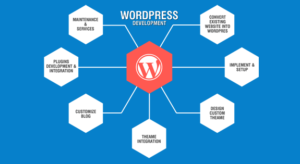When it comes to choosing a CMS platform for your website, WordPress is often the first option that comes to mind. However, there are other popular CMS platforms that can also be great options depending on your specific needs. In this article, we will compare WordPress with other CMS platforms like Shopify and Drupal, and provide some insights on which one might be the best fit for you.
1. WordPress
WordPress is a free, open-source CMS platform that powers more than 40% of the internet. It is known for its ease of use, flexibility, and versatility. WordPress allows users to create and manage any type of website, from a simple blog to a complex e-commerce site. It has a vast library of plugins and themes, which makes customization a breeze. However, WordPress also requires some technical knowledge, and users need to be careful about security and updates.
2. Shopify
Shopify is a popular e-commerce platform that allows users to create and manage their online store. It is a subscription-based service that provides all the necessary tools to build an e-commerce website, from product management to payment processing. Shopify is known for its user-friendliness, and it requires little to no technical knowledge to set up and maintain a store. However, Shopify is not as customizable as WordPress, and users need to pay for additional features and plugins.
3. Drupal
Drupal is a free, open-source CMS platform that is known for its scalability and security. It is a great option for large and complex websites that require advanced features and functionalities. Drupal has a steep learning curve and requires some technical knowledge to set up and manage. However, it offers a high level of customization and flexibility, and it is a great option for enterprise-level websites.
4. Joomla
Joomla is a free, open-source CMS platform that is known for its flexibility and user-friendliness. It is a great option for small and medium-sized businesses that need a website with a variety of features, such as e-commerce, social networking, and blogging. Joomla has a large library of extensions and templates, which makes customization easy. However, it is not as popular as WordPress or Drupal, and it requires some technical knowledge to set up and manage.
Conclusion
When choosing a CMS platform, it is important to consider your specific needs and requirements. WordPress is a great option for users who want a customizable and versatile platform, while Shopify is ideal for e-commerce websites. Drupal is a great option for enterprise-level websites, and Joomla is a good choice for small and medium-sized businesses.



